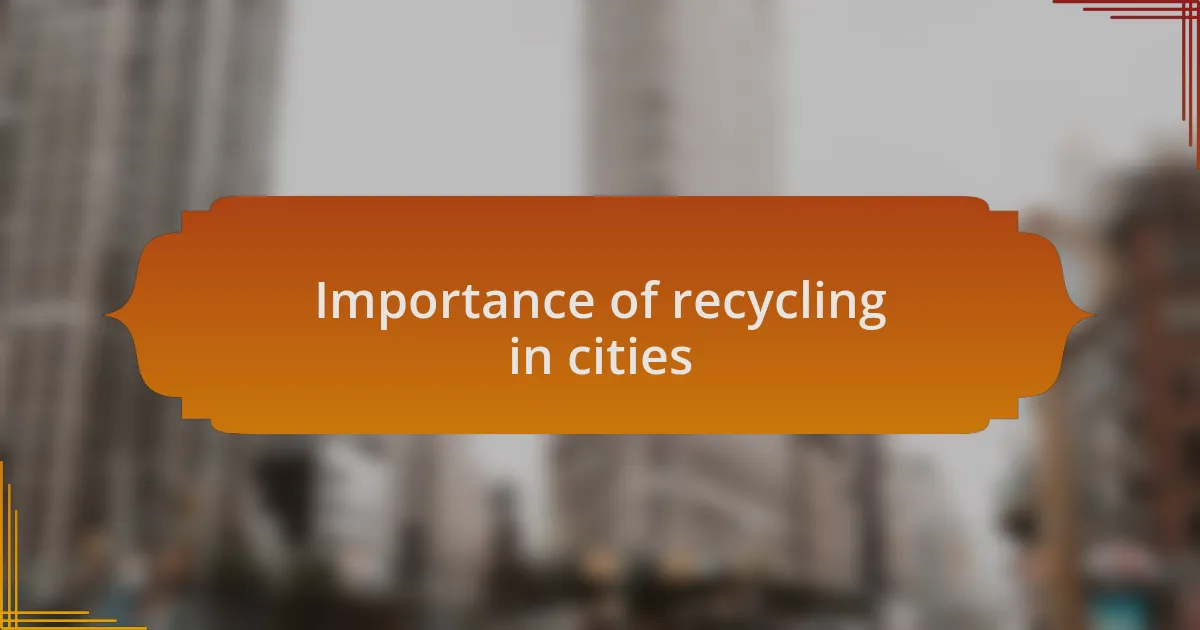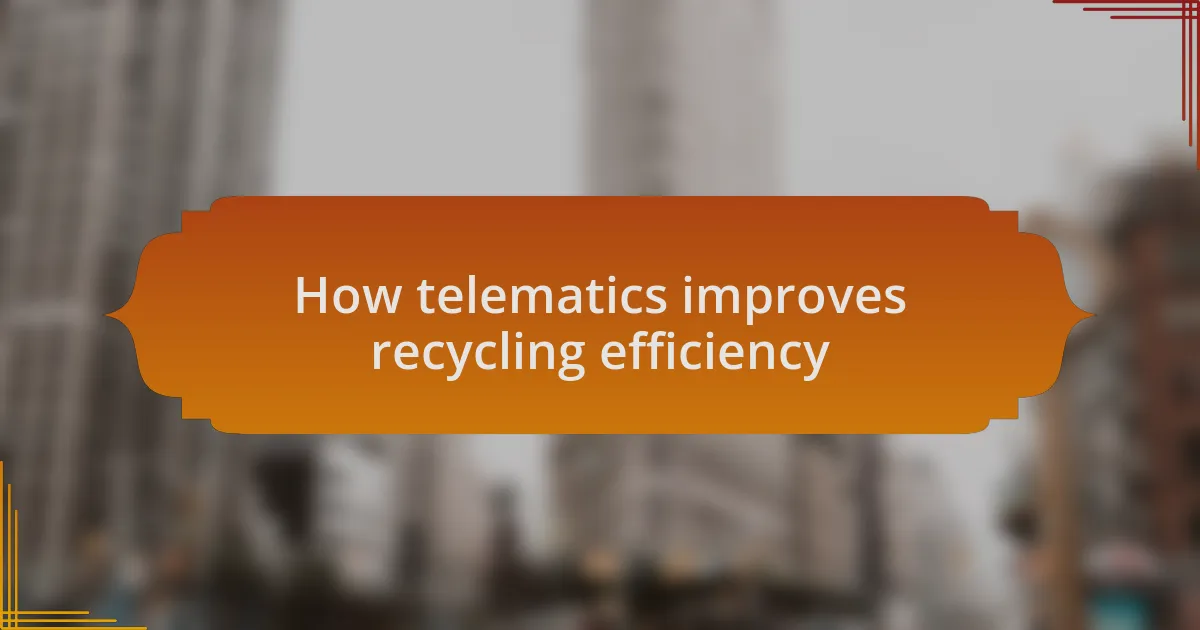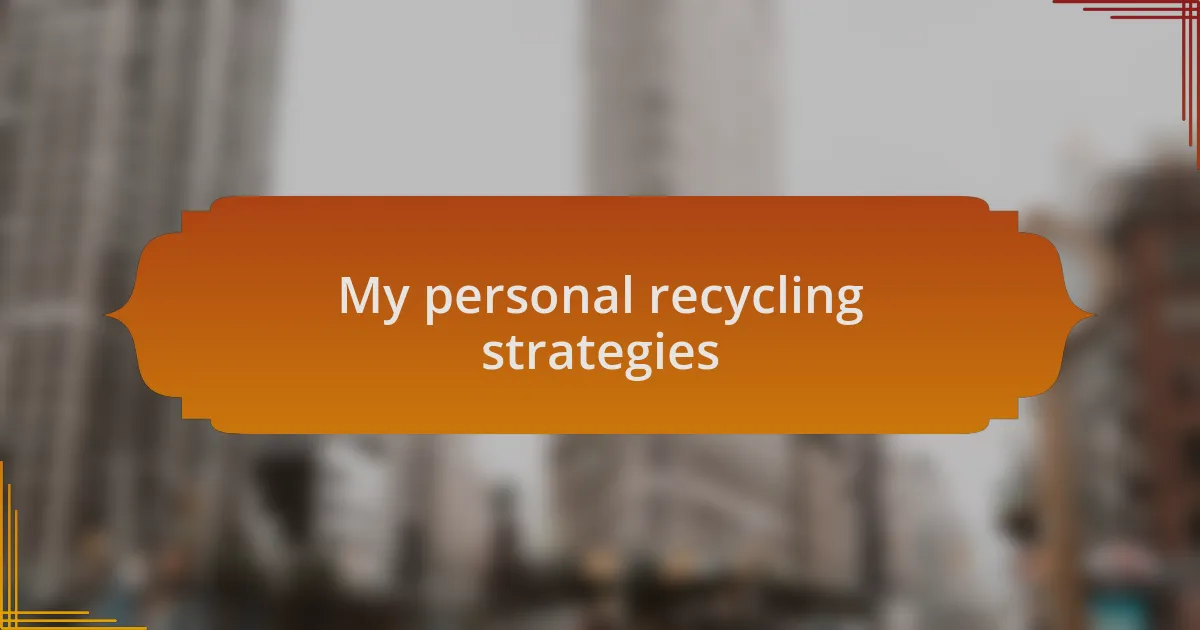Key takeaways:
- Urban telematics networks enhance city management by analyzing data related to transportation, infrastructure, and environmental factors, leading to improved quality of life.
- Recycling in cities is crucial for reducing waste and greenhouse gas emissions, fostering community pride, and emphasizing the importance of individual actions.
- Integrating telematics in recycling operations optimizes routes and reduces waste by providing real-time data, ultimately leading to more efficient waste management.
- Personal recycling strategies, such as separating materials and using tracking apps, can significantly improve recycling efforts and community engagement.

Understanding urban telematics network
Urban telematics networks play a crucial role in how cities manage data related to transportation, infrastructure, and environmental factors. I remember my first encounter with this technology when I noticed how a simple app on my phone could provide real-time updates on public transportation schedules. It made me think: how often do we take for granted the intricate systems that keep our urban environments running smoothly?
The integration of sensors and communication technologies allows for a wealth of data to be collected and analyzed. For instance, I once saw how a city improved traffic flow by identifying congestion points through this network. It was enlightening to realize that data-driven decisions not only enhance my daily commute but also contribute to better air quality and reduced energy consumption. Isn’t it fascinating how something as intangible as data can lead to tangible improvements in our everyday lives?
As cities continue to evolve, the need for an effective urban telematics network becomes even more pressing. I often ponder how these systems can create safer and more efficient urban spaces. The thought of living in a more connected and responsive city excites me, as I believe this could ultimately lead to improved quality of life for all residents. How about you? Have you experienced the benefits of such networks in your own city?

Importance of recycling in cities
Recycling in cities is essential for reducing waste and conserving resources. I often think back to a community cleanup event where we collected countless plastic bottles, sparking discussions about how much we could reduce if more people actively recycled. It’s alarming to realize that without these efforts, a significant amount of recyclable materials ends up in landfills, harming our environment.
Moreover, effective recycling practices can significantly lower greenhouse gas emissions. The first time I learned about the energy savings associated with recycling aluminum cans, I was astonished—recycling just one can saves enough energy to power a television for three hours. Isn’t it incredible to consider how our small actions can lead to substantial environmental benefits?
Cities that prioritize recycling programs also foster a sense of community pride and responsibility. Reflecting on my own neighborhood, I’ve witnessed how a local recycling initiative brought neighbors together, encouraging dialogue about sustainability. How often do we have the chance to bond over something as important as preserving our planet for future generations?

How telematics improves recycling efficiency
Integrating telematics into recycling operations offers a transformative approach to waste management. I remember visiting a recycling plant that utilized real-time data tracking; it was fascinating to see how they optimized collection routes based on traffic patterns. This kind of efficiency not only reduces fuel consumption but also minimizes delays, ultimately ensuring that recyclable materials are processed quicker and less waste is left behind. Have you ever stopped to think about how much money and energy could be saved by simply knowing the most efficient route?
Telemetry also empowers waste management teams by providing insights into fill levels of recycling bins. In one instance, I observed a neighborhood that had implemented smart bins connected to a central system. Instead of sending trucks out on fixed schedules, they dispatched them only when bins were full. This not only cuts down on unnecessary trips but also ensures that recyclable materials aren’t left to overflow, creating unsightly messes. Isn’t it exciting to think about how technology can help us reclaim our spaces?
Moreover, the data collected from telematics can track recycling trends and identify patterns in waste generation, which can inform future strategies. I found it incredibly rewarding to learn that cities using this technology could adjust their public awareness campaigns based on what residents were recycling most. It’s like having a pulse on the community’s habits, allowing for tailored solutions that resonate more effectively. How powerful would it be if every neighborhood could leverage such specific insights to enhance their recycling efforts?

My personal recycling strategies
When it comes to my recycling strategies, I focus heavily on separating materials at home. I have dedicated specific bins for paper, plastics, and metals, labeling each one clearly. This simple step not only makes recycling easier but also helps me feel more connected to the process. Have you ever taken a moment to truly appreciate how much simpler it is when everything has its place?
I also find it beneficial to educate myself about local recycling guidelines. Last year, I discovered that my community had specific rules about the types of plastics accepted, which had changed without much notice. Understanding what can and cannot be recycled has dramatically reduced my contamination rates. It’s surprising how much small adjustments can impact the effectiveness of our recycling efforts, don’t you think?
Another strategy I adopt is utilizing my smartphone to track my recycling habits. I’ve downloaded an app that helps me log what I recycle each week. It not only serves as a reminder, but it also motivates me to reach my recycling goals. Seeing tangible results on my screen is rewarding—it feels like I’m contributing to something bigger than myself. Have you ever used a tool like that to hold yourself accountable?